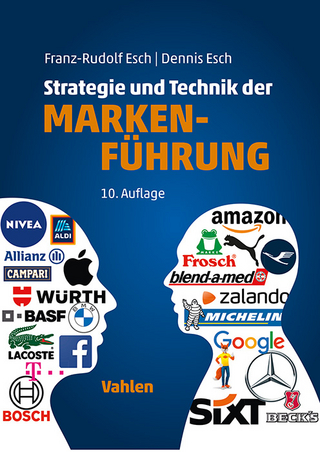
Business Ethics
Routledge (Verlag)
978-1-138-49368-1 (ISBN)
- Titel erscheint in neuer Auflage
- Artikel merken
Business Ethics: Methods and Application provides a new systematic approach to normative business ethics that covers the complex and various ethical challenges of modern business. It aims to train analytical thinking skills in the field of business ethics and to approach ethical issues in business in a rational and systematic way. The book develops a number of specific methods for business ethics analysis that are tailored for ethical decision-making in business and for analyzing complex ethical topics in business.
The book discusses fundamental ethical questions regarding the meaning of business and the economy for the individual person, society, the environment, and people around the world. As a result, Business Ethics: Methods and Application develops normative guidelines for business in the 21st century and its fundamental challenges and will be key reading for undergraduate, postgraduate, and MBA students of business ethics, business strategy, business and society, and related fields.
Christian U. Becker lives with his family in Fort Collins, Colorado, USA, and is a faculty member at the College of Business at Colorado State University. He earned his Ph.D. in economics from Heidelberg University (2003) and his Habilitation in philosophy from Kaiserslautern University (2010). His primary research and teaching interests are in theoretical and applied ethics, the history of economic thought, and sustainability studies. He has taught business ethics for more than ten years in Germany, Canada, and the United States. Becker has published on ethical and economic topics in various journals, such as Archives for Philosophy of Law and Social Philosophy; Ecological Economics; Ethical Theory and Moral Practice; Ethics, Policy and Environment; Environmental Values; and European Journal for the History of Economic Thought.
Chapter 1 Introduction to business ethics: approach and subject matter
1.1 What is the relationship between ethics and business?
1.1.1 The instrumental perspective of business ethics
1.1.2 The philosophical perspective of business ethics
1.2 The levels of business ethics
1.3 The relevance of business ethics – why is it important?
1.4 How to analyze and address ethical aspects of business: the approach of this book
Chapter 2 Ethical theory and its application to business contexts
2.1 The meaning of ethics
2.1.1 Sources of everyday values and norms, and the function of ethics
2.1.2 A definition of ethics
2.1.3 (How) is normative ethics possible?
2.2 Moral philosophy and methods for ethical decision-making
2.2.1 Utilitarianism
2.2.2 Kantian ethics
2.2.3 Virtue ethics
2.3 Applying ethical theory to case analysis and ethical decision-making in business
2.3.1 Case 1: The underperforming friend
2.3.2 Case 2: XYZ Shoes, Inc.
2.3.3 Case 3: Free chocolate cake
2.4 More ethical theories: ethics of care, Rawlsian ethics, discourse ethics
2.4.1 Ethics of care
2.4.2 Rawlsian ethics
2.4.3 Discourse ethics
2.4.4 Overview: methods for ethical analysis and decision-making
Chapter 3 Conceptions of the economy and business: ethical aspects
3.1 Basic definitions and ethical questions
3.2 Adam Smith – the economy as a system of natural freedom
3.3 Modern economics – rational choice and systemic interaction results
3.3.1 Public goods
3.3.2 External effects
3.4 The ethical underpinning of capitalism
3.4.1 Efficiency
3.4.2 Competition
3.4.3 Optimal balance and satisfaction of individual self-interests
3.4.4 Support of individual freedom and equal opportunities
3.4.5 Promotion of overall societal welfare
3.5 Criticism of capitalism
3.5.1 Traditional criticism
3.5.2 Fundamental ethical principles and criticism
3.5.3 New criticism
3.6 Shifting norms: ethics in and for the economy of the 21st century
3.7 Two tales of the pencil
3.7.1 Tale of the pencil: the neoclassical version by Milton Friedman
3.7.2 An alternative tale of the pencil: considering external costs and sustainability
Chapter 4 Organizational ethics: ethics of corporations, companies, and other business organizations
4.1 What is the moral responsibility of a business?
4.1.1 The concept of responsibility
4.1.2 Business-specific (company-specific) responsibilities
4.2 Methods for determining business-specific responsibilities
4.2.1 Determining business-specific responsibilities based on an Ethical Life Cycle Assessment (ELCA)
4.2.2 Determining business-specific responsibilities based on an Ethical Stakeholder Analysis (ESA)
4.3 Corporate responsibility (CR)
4.3.1 A broader perspective on the overall responsibilities of a modern business
4.3.2 Defining CR
4.3.3 Justification of CR: Why is CR important? What are reasons for businesses to consider and implement CR strategies?
4.4 Methodology for CR analysis and CR design
4.5 Internal ethics and culture of organizations
4.5.1 Ethical culture of organizations
4.5.2 Ethics and compliance programs
Chapter 5 Individuals in the world of business: ethical aspects of specific roles and professions
5.1 Ethical aspects of being an employee
5.1.1 Moral rights of employees
5.1.2 Responsibilities of employees
5.2 Ethical aspects of leadership
5.2.1 What defines great leadership?
5.2.2 What are ethical foundations of leadership?
5.3 Professional ethics
5.3.1 Professional ethics and moral self-identity
5.3.2 Core principles of professional ethics
5.3.3 The example of the accounting profession
5.4 Ethical challenges of working in specific business functions: the example of marketing ethics
5.4.1 Normative guidelines for marketing
5.4.2 Ethical challenges in marketing
5.4.3 Ethics-based marketing strategies: ethical branding
5.5 Whistleblowing
5.5.1 Whistleblowing: definition and ethical aspects
5.5.2 A method for analyzing whistleblowing situations
5.5.3 Organizational aspects
5.5.4 Personal aspects
5.5.5 Societal aspects
Chapter 6 Global business ethics
6.1 Global business ethics: cases
6.1.1 Case 1: Child labor and slavery in the global chocolate industry
6.1.2 Case 2: Outsourcing of manufacturing jobs
6.1.3 Case 3: The globalization of e-waste
6.2 Ethical challenges of globalization and global business
6.3 Global business ethics: principles
6.3.1 Basic global business ethics
6.3.2 Advanced global business ethics
Chapter 7 Economic and ethical challenges of the 21st century: sustainability
7.1 The challenge of sustainability and ethical implications
7.1.1 The concept of sustainability
7.1.2 The ethics of sustainability
7.1.3 The relevance of sustainability
7.2 Sustainable economy and sustainable business
7.2.1 Reasons why business should care about sustainability
7.2.2 Sustainability as business opportunity and business task: examples
7.3 New business models and norms - the example of the benefit corporation
Conclusion
| Erscheinungsdatum | 18.12.2018 |
|---|---|
| Zusatzinfo | 4 Tables, black and white |
| Verlagsort | London |
| Sprache | englisch |
| Maße | 174 x 246 mm |
| Gewicht | 453 g |
| Themenwelt | Geisteswissenschaften ► Philosophie |
| Wirtschaft ► Betriebswirtschaft / Management ► Marketing / Vertrieb | |
| Wirtschaft ► Betriebswirtschaft / Management ► Unternehmensführung / Management | |
| ISBN-10 | 1-138-49368-6 / 1138493686 |
| ISBN-13 | 978-1-138-49368-1 / 9781138493681 |
| Zustand | Neuware |
| Haben Sie eine Frage zum Produkt? |
aus dem Bereich



